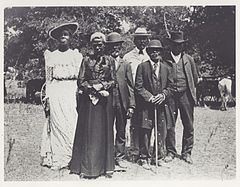Juneteenth
Juneteenth[b] (officially Juneteenth National Independence Day and historically known as Jubilee Day,[2] Black Independence Day,[3] and Emancipation Day[4][5]) is a federal holiday in the United States commemorating emancipation of enslaved African Americans. It is also often observed for celebrating African American culture.[6] Originating in Galveston, Texas, it has been celebrated annually on June 19 in various parts of the United States since 1866. The day was recognized as a federal holiday on June 17, 2021, when President Joe Biden signed the Juneteenth National Independence Day Act into law.[7][8][9] Juneteenth's commemoration is on the anniversary date of the June 19, 1865, announcement of General Order No. 3 by Union Army general Gordon Granger, proclaiming and enforcing freedom of enslaved people in Texas,[10] which was the last state of the Confederacy with institutional slavery.
President Abraham Lincoln's Emancipation Proclamation of 1862 had officially outlawed slavery in Texas and in all of the other states of the original Confederacy. Enforcement of the Proclamation generally relied upon the advance of Union troops. Texas, as the most remote state of the former Confederacy, had seen an expansion of slavery and had a low presence of Union troops as the American Civil War ended; thus, enforcement there had been slow and inconsistent prior to Granger's announcement.[10]
Although the Emancipation Proclamation declared an end to slavery in the Confederate States, due to certain political considerations, for a short while longer slavery was still legal and practiced in the two Union border states – Delaware and Kentucky. This seemingly conflicted situation ended both with the ratification of the Thirteenth Amendment to the Constitution which constitutionally abolished chattel slavery nationwide on December 6, 1865, and also with the final actual release of slaves by the Indian Territories that had sided with the Confederacy, namely the Choctaw, in 1866.[11][12][13][c][14]
Celebrations date to 1866, at first involving church-centered community gatherings in Texas. It spread across the South and became more commercialized in the 1920s and 1930s, often centering on a food festival. Participants in the Great Migration out of the South carried their celebrations to other parts of the country. During the Civil Rights Movement of the 1960s, these celebrations were eclipsed by the nonviolent determination to achieve civil rights, but grew in popularity again in the 1970s with a focus on African-American freedom and African-American arts. Beginning with Texas by proclamation in 1938, and by legislation in 1979, 49 U.S. states and the District of Columbia, have formally recognized the holiday in various ways.[d]
Modern observance is primarily in local celebrations. Traditions include public readings of the Emancipation Proclamation, singing traditional songs such as "Swing Low, Sweet Chariot" and "Lift Every Voice and Sing", and reading of works by noted African-American writers, such as Ralph Ellison and Maya Angelou. Celebrations include rodeos, street fairs, cookouts, family reunions, park parties, historical reenactments, and Miss Juneteenth contests. Juneteenth is also celebrated by the Mascogos, descendants of Black Seminoles who escaped from slavery in 1852 and settled in Coahuila, Mexico.[19][20] Juneteenth is the first new federal holiday since Martin Luther King Jr. Day was declared a holiday in 1983.

No comments:
Post a Comment